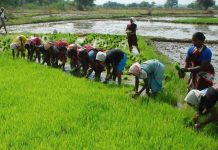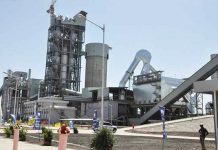
NAVSA: Changing the Reality In the Agricultural Sector
By Lukman Oladokun
…the National Adopted Village for Smart Agriculture (NAVSA)…is an ecosystem-driven digital platform envisioned for the transformation of the agricultural sector in Nigeria. It is envisaged that the programme would assist the farmers and other stakeholders in the agricultural ecosystem to navigate the journey across the sector value chain, involving farm production and the management of their produce.
“You never change things by fighting the existing reality. To change something, build a new model that makes the existing model obsolete.” — Buckminster Fuller
We live in a time of digital transformation and it is driving change in all areas. The ubiquitous nature of information and communications technology (ICT) in revolutionising every human endeavour has made its adaptation also in agriculture universally popular. Developed nations are achieving food sustainability due to early adoption of ICT in their farming processes.
In a report to the G20 Agricultural Deputies in 2017 on Information and Communication Technology in Agriculture by the Food and Agricultural Organisation (FAO), by 2050 the world population is expected to surpass nine billion and for the world to meet the attendant increase in food demand, agricultural production will need to increase by 60 per cent from its 2018/2019 current level, in order to meet the additional global food need.
Application of ICT to collect and share timely and accurate information on weather, inputs, markets and prices to the stakeholders in agricultural value chain would play a significant role to meet this global food demand.
In Nigeria, with a population of about 200 million and 48.84 per cent of the population in the agricultural sector, the importance of the adoption of ICT in farming techniques cannot be overemphasised. It is in recognition of the significance of sustainable food systems for food security and growth, and the need to provide targeted information to every farmer, that the Federal Government of Nigeria mandate NITDA “to improve food production and security” and also “to ensure that the entire citizenry is empowered with Information Technologies through the development of critical mass of IT proficient and globally competitive manpower”.
The Agency has swung into action to actualise these mandates through many initiatives. As far back as the beginning of the millennium, the Agency entered into partnership with United Nations Economic Commission for Africa (UNECA) to produce the Nigeria ICT4D document, which details the roles that ICT could play in rejuvenating 12 critical sectors of the economy, with agriculture taking a centerpiece.
As part of the efforts to help farmers in Nigeria adopt more efficient and sustainable production methods, reduce the burden of labour-intensive tasks and manage their farms better to help build a more resilient and productive food system, the Agency in 2019 initiated a value addition process for agriculture, named the National Adopted Village for Smart Agriculture (NAVSA), which is an ecosystem-driven digital platform envisioned for the transformation of the agricultural sector in Nigeria. It is envisaged that the programme would assist the farmers and other stakeholders in the agricultural ecosystem to navigate the journey across the sector value chain, involving farm production and the management of their produce.
The main thrust of the programme is the integration of digital technologies and innovations to improve productivity and the income of farmers and other ecosystem players, in a bid to reposition agriculture as a viable business that has the potentials of attracting the youthful population in the country. At the lunch of the pilot phase of the prograemm in Jigawa, one of the States that has comparative advantage in agriculture, the minister of Communications and Digital Economy, Dr. Isa Ali Ibrahim Pantami observed that “the way agriculture is practiced needs to be modernised and transformed in a manner to encourage young talents to set up agriculture enterprises and position agriculture as a major means of economic diversification and growth, thereby increasing its contributions to the nation’s GDP.”
An in-depth analysis of the programme reveals that it is aimed at helping the administration of President Muhammadu Buhari to achieve two of its three cardinal objectives, by improving the economy and fighting insecurity. The pilot started with 130 farmers “adopted” into the programme. Expectedly, the initiative gave rise to a new agricultural business model and the opportunity to stimulate its huge potentials in job and wealth creation, with the attendant effect of playing a major role in diversification from the monolithic economy that the nation is known for.
Arguably, the initiatives of previous governments aimed at putting the agricultural sector on a pedestal that makes it fascinating and ensures food sufficiency could not be said to have been successful largely due to the dispassionate mindset of Nigerian youths, who do not see a future in venturing into agricultural businesses. This is occasioned by the retention of old-fashioned agricultural practices, the inadequate provision of credit facilities, the lack of markets to sell farm produces and other challenges. Nowadays, with digital technologies making incursions into every human endeavour and the relatively large population of technology savvy youths, a good and well articulated programme like NAVSA would proffer solutions to these challenges.
In his remarks at the closing of the two-week long training on how youths can use digital tools for agricultural purposes, the director-general of NITDA, Mallam Kashifu Inuwa Abdullahi maintained that the agricultural sector remains one of the critical sectors of the economy that can leverage digital innovations to create jobs, wealth and build a vibrant digital economy for Nigerians. However, he decried the position of the sector in the usage of technological tools as dismal. He said that, “agriculture remains one of the least digitised sectors in Nigeria, despite its potential as one of the most veritable sectors for economic diversification.”
The twin challenge of meeting the domestic food requirement for the attainment of a food sufficient nation and production of quality produce for the international market, which are occasioned by inadequate access to appropriate information almost in real-time; inadequate entrepreneurship ideas; and poor knowledge of agricultural value chain opportunities for existing and emerging agricprenuers, would eventually be things of the past with the proper implementation and adoption of the programme. These will be achieved by providing information to stakeholders through the introduction of digital technologies and innovation across the agriculture value chain in a transformative manner.
In mitigating these challenges, the project focuses on the adoption of a “radical rethink” and collaborative approach between the public and private sectors that operate across the value chain. To achieve this, a proposed strategy requiring consensus-building and connecting ecosystem players toward a shared vision has been identified. NITDA, using NAVSA, intends to collaborate with 22 industry players, with each of them entering into an agreement or signing a Memorandum of Understanding (MoU) on the expected roles it will perform. The ecosystem includes farmers; federal, state and local governments; input suppliers and produce off-takers; mobile/telecommunications service providers; banks; FinTech platforms; smart solutions service providers; renewable energy service providers; investors; development partners; agriculture platforms; startup businesses, agriculture experts and extension workers, among others.
The values these partners would bring to the success of the programme was alluded to at a closing cerimony of the training at Duste, Jigawa State by the state governor, His Excellency, Mohammed Badaru. He confirmed that NITDA has partnered with telecom operator (MTN) and has developed a special package for smart farmers, which comes with 4G SIM cards with a one-year internet data subscription. Other add-ons to the digital tools include certified seeds, smart water pumps machines, fertilisers and other items.
He stated further that “NAVSA created a wallet scheme with seed capital of N200,000 for each smart farmer. Both the state government and NITDA contributed half of the amount each. The wallet scheme is designed to domicile money for proper projects execution, whereas JASCO will serve as a farm inputs service provider.”
In ensuring that funds for the project are not used for other purposes other than what they are meant for, the project is designed in a way that all transactions are required to go through the platform with the aid of the digital wallet. Funds are not allowed to exchange hand and the only way a farmer could access the fund is through request on the platform to a NAVSA registered input supplier. In making it a self-sustaining venture, it is also designed in such a manner that allows smart farmers to plough 75 per cent of their profits back into the open wallet, where it can be cashed out and the remaining balance of 25 per cent goes into a restricted wallet to increase the investment capital.
This laudable initiative intends to create six million jobs in the next 10 years. This may look so ambitious but the strategies put in place to accomplish the aspiration is well tailored with articulated key performance indicators that provide guidelines for it. The strategy is targeted at adopting farmers in all 36 States and 774 LGAs in the country, supporting and equipping them with skills and resources that will make Nigeria one of the leading nations in food sufficiency, security and exportation.
It has now become imperative, more than ever before, to adopt the use of technology to combat hunger and promote sustainable agricultural practices that are attractive to youths. Digital technologies and innovations are at the heart of managing the agriculture value chain, from seedling to when they are off taken. And these are the targets of NAVSA, going forward.
Lukman Oladokun is with NITDA’s Corporate Affairs and External Relations Unit.

































